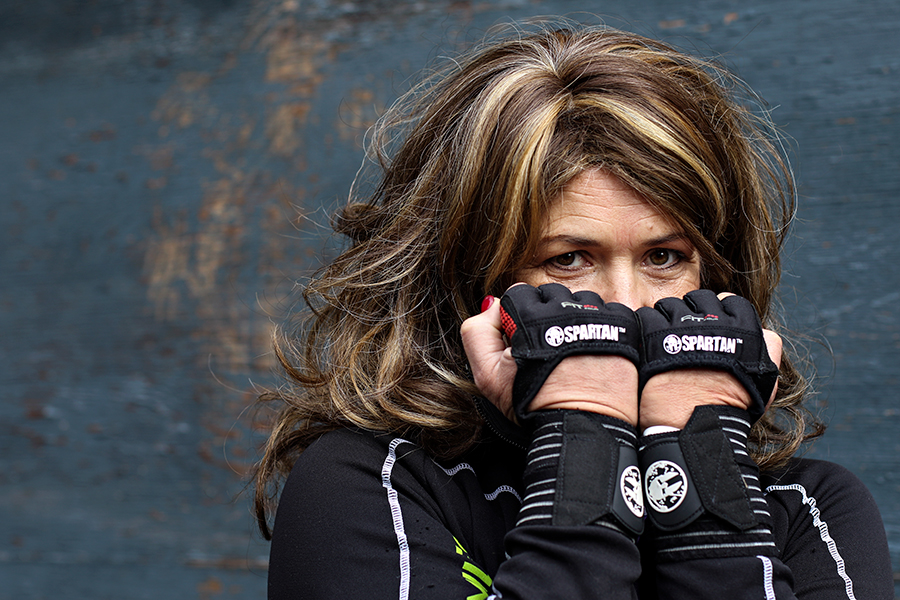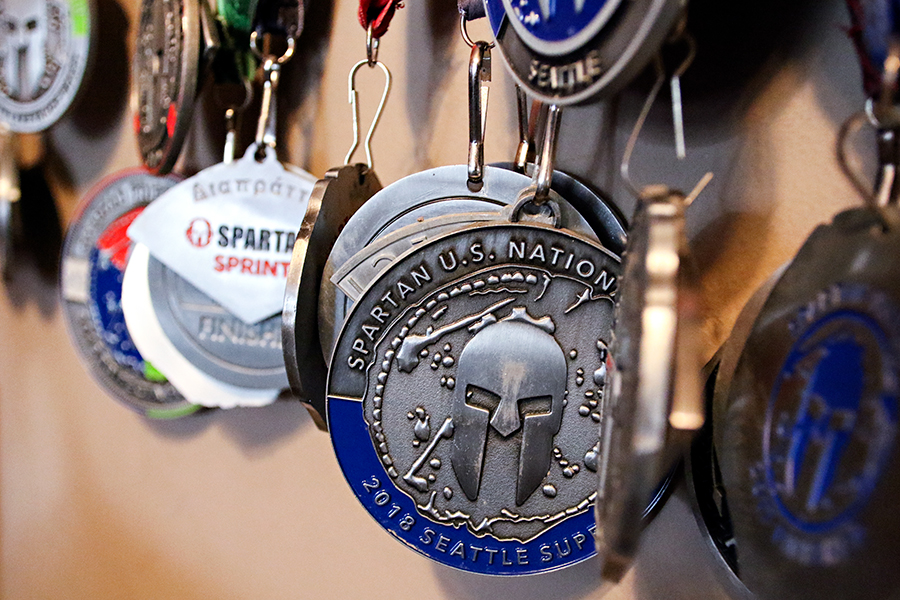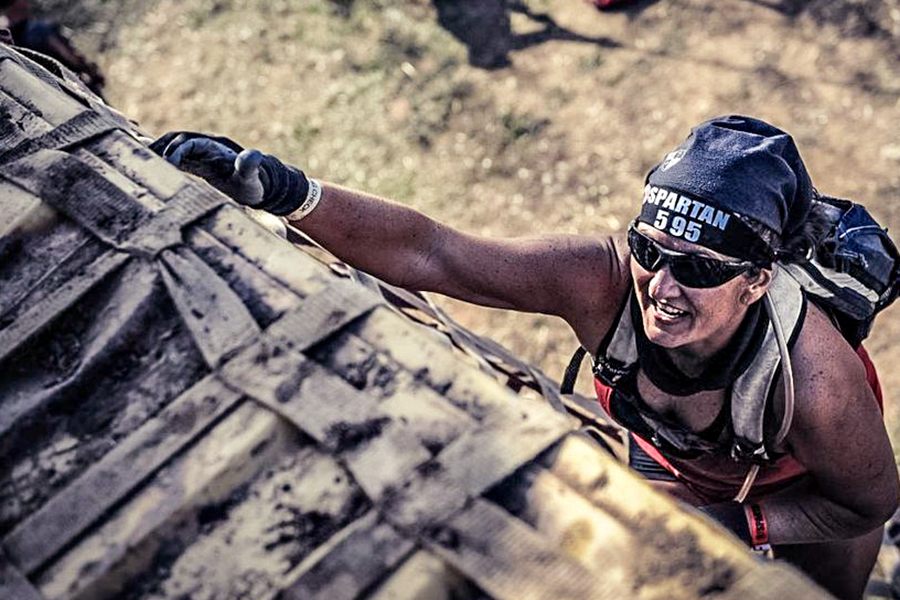A Spartan’s Struggle
Ferndale resident Rhonda Hughes rose from the deepest, darkest depths of mental illness and found strength, courage and confidence in Spartan racing
By Andy Viano
Rhonda Hughes’ ancestors walked from Wyoming to the shores of Flathead Lake in search of a better life. They found a piece of land to homestead and became some of the first cherry growers, she says, on the east side of the lake. That’s how Hughes, an Oregon native, ended up spending her childhood summers in the Flathead Valley, ostensibly working in the cherry orchard but mostly indulging youthful impulses.
The ancestors are gone and the property sold, and today Hughes is one of the last remnants, living in a modest house tucked away near the Swan River in Ferndale. She is home here with her youngest son, in a place that is unremarkable but for a small shrine near the dining room, adorned with a row of medals and a collage of photos, most of which show Hughes in some messy state of exhaustion and exhilaration, surrounded by friends and family.
They are a tribute to the 49-year-old’s Spartan racing career, which will continue at this weekend’s Montana Beast and Sprint in Bigfork. Hughes competed in her first Spartan race here three years ago, a day she spent walking, running, crawling, climbing and crying. A day, she says, that changed her life, and created a feeling eons away from her comfortable house in Pocatello, Idaho, spotless and organized, with a broad upstairs bay window that looks out over the mountains.
Inside that house on an ordinary fall day in 2005, 35-year-old Rhonda Hughes was on the phone. Her three young children, none more than five years old, were playing in another room. On the other end of the line was her mother, Magel Wetmore, and they were talking about a dresser that Hughes had with her in Pocatello. One of Hughes’ six siblings, a sister, had two matching nightstands that went with the set and was planning to get rid of them. Overhearing the conversation at their mother’s house, Hughes’ sister shouted in the direction of the phone that she would sell the pair for $150.
“That was it,” Hughes said, reliving the phone call 14 years later from a high-top dining room table in her Ferndale home. “That was the end.”
Hughes dropped the phone and tore through the house in a rage. She threw anything and everything she could find. She screamed at her kids. She tossed their toys out the front door. She went to her bedroom, barricaded the door, and her mind went blank.
When her husband came home from work that night he found his wife in the fetal position in the closet. When her mom arrived early the next morning, having overheard the violent incident as the phone sat on the floor, Hughes was on her hands and knees, washing her kitchen floor with a toothbrush.

Hughes is blunt and jarringly candid when she talks about her mental health. She punctuates the darkest stories with explosive fits of laughter but otherwise rarely hesitates when recalling her three suicide attempts, nine stints in a mental hospital, the umpteen thousands of dollars she gambled and frittered away, the money she stole from friends and family, and the waves of lies and broken promises that shredded every relationship she’d ever had.
But there was a time not too long ago when Hughes was so scared to admit any of it that it almost killed her.
The fall night in 2005 was, at that time, the clearest indication that Hughes was suffering from bipolar disorder, a malady broadly defined by erratic changes in mood. The disorder is sometimes called manic-depressive illness, because a person experiences periods of mania (an extreme, often jittery, surge of energy and irritability) and depression (a period of very low energy and feelings of sadness and hopelessness). The National Institute of Mental Health estimates that more than 4 percent of Americans will experience bipolar disorder at some point in their life, and a family history with the disorder significantly increases that percentage.
Bipolar disorder was nothing new to Hughes. She is a nurse who comes from a nursing family, and bipolar disease has plagued that same family. Her father, Robert Wetmore, suffered for years before he passed away in 1998, and one of Robert’s sisters was bipolar and died by suicide.
So when Rhonda curled up in her closet she had a pretty good idea what was happening. But it would be two years before she would get any outside help, or even talk honestly with family members who were suffering in the same way.
“I kept it tucked away in my sleeve,” she said. “It was embarrassing.”
Hughes said she was on the way to end her life in 2007 when she finally saw a mental health professional. She found the office by accident, walked inside, was told she needed an appointment to see the doctor, and responded by saying she was going to kill herself that day. The doctor cleared his schedule, went back with Hughes to her house, and waited for her husband to come home. They drove to the hospital that night.
The next three years are mostly a blur, Hughes says. Reckless spending and a habit of hiding unpaid bills had left her family’s finances in ruin. She picked up an addictive gambling habit and fed it by selling her plasma and pawning her and her children’s belongings. She was on a varying mix of prescription medications that would put her in what she called a “psychiatric coma” for years.
The most painful moments were ones of loss. She was told during her first hospitalization in 2007 that she would never work as a nurse again and she and her husband were divorced in 2010. The real heartbreak came when she left her kids that same year and moved back to Oregon to be closer to family. But that wasn’t the end, either. Hughes stole from family members, ignored their attempts to counsel her, took control of what remained of her finances and moved to Ferndale in September 2011. Less than a year later she was in the hospital again.
“Everyone was disgusted with me,” Hughes said. “I checked in (to the hospital) and realized that in this world, with billions of people, there was not one person I could call. Everyone had washed their hands, and that was a very, very lonely feeling, when you realize that you have hurt every single person that loved you.”

Hughes’ story, and especially the story of how she arrived at today, is immensely complicated and nuanced. Diagnosing bipolar disorder can involve a complex web of familial, environmental and situational factors. Treating the disorder can be even more complex. Hughes went through all manner of treatments and medications on her road to recovery, and most likely a combination of those things and others both created and turned around the nightmare Hughes was living.
But what Hughes believes, and is emphatic about, is that Spartan racing changed her life.
Something changed when she realized, during her final hospital stay, that she was alone, and when she got out after just three days she and her doctor radically decreased the number of medications she was taking. She started working as a nurse again and “apologized for everything I did” to any friends and family who would hear her. Eventually under her doctor’s supervision, she stopped taking medication altogether.
She was living in Oregon in 2015 when she and her sister Julie Curley, who is 12 years her elder, planned a trip to Jamaica with Curley’s adult son. Before they went, though, they decided they needed to get into bathing suit shape and hired a personal trainer who put the pair through a series of brutal workouts.
When they were in Jamaica, in February 2016, Hughes pitched a new idea to her sister. She had heard about something called a Spartan race and wanted to try it. And lo and behold, there was a race in Bigfork later that year. Both women were on their way to losing 80 pounds, and making happy memories together for the first time in years. Curley agreed to give Spartan racing a shot.
The sisters had no idea what they were in for.
Spartan races first started popping up in 2010 and employ brutal physical challenges along a several mile-long mountainside course. This year’s Montana Spartan weekend begins with the 13-mile, 30-obstacle Beast race on May 4. The more palatable three-mile, 20-obstacle Sprint is May 5.
Hughes took off from the starting line in 2016 and was immediately miserable. She was cold and exhausted, and felt like giving up. But somewhere along the way she found a mantra.
“I internalized it,” she said. “I was like, you know what, this is what I deserve. This is my pain. For every single person I hurt, this is finally it. And so every single step I named a name.”
Hughes cried her way up the mountain, apologizing to her husband, to her children, to her siblings and to her friends with tears rolling down her face. She met up with Curley, who had left in an earlier group, at a 10-foot wall and they helped each other get over it. On the other side she told her sister, “I am just done. And I’m going to leave it right here on this mountain.”
Hughes tore through the rest of the course with a newfound lightness, and both she and Curley cried when the elder sister finished the race with Hughes cheering her on. Hughes ran another Spartan race in Arizona in 2017, this time in the competitive age group division, and she’s been piling up Spartan medals ever since. She is not the fastest or the strongest, but she does not quit.
“My goal is to finish and my biggest competition is me,” she said. “Because oftentimes we are our biggest competition, whether we tell ourselves we can’t do that or we shouldn’t do that or we’re not good enough or that person’s better than me … I’m my biggest enemy.”
Hughes was a double-trifecta finisher last year, completing two Beast races, two Sprint races, and two Super races (in between Sprint and Beast). That accomplishment qualified her for the Spartan World Championships in Sparta, Greece, where she completed three races in two days. She entered a pair of races in Seattle last month and finished high enough to qualify for the North American Championships in West Virginia later this year. She also plans to return to Greece this summer.
More than medals, though, Spartan racing has been the conduit through which she has put her life back together. She has rebuilt her relationship with her three kids, even competing in Spartan races with each of them, and she has built a network of friends in the Spartan community she competes and trains with. She is working as a nurse again.
“Spartan racing is a race like no other, it pushes you,” Hughes said. “When you’re out there and you’re freezing and your hands are cold and you’ve done 100 burpees and you’ve done 40 obstacles and you’ve still got two to go and there’s another freaking wall, you’re like why do I do this? Is this really fun? I’m freezing, I’m cold, I’m miserable, I’m hungry … And that’s when I really dig. I do this because it keeps me healthy. I do this because it makes me a better person. I do this because my kids need a positive role model.”
“Physically, it’s the hardest thing I ever did, and mentally it’s the most freeing thing I ever did.”